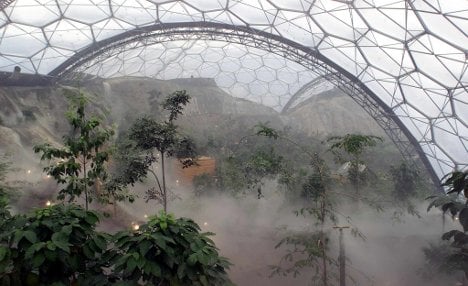A tropical microclimate will defy the snow and ice that normally grip the frozen winter landscape of this part of Germany. Upper Franconia will never be the same again.
But this is not an attempt to put a pleasant spin on global warming. Instead, an ingenious new project to siphon heat from a glass factory will be doing its bit to save the atmosphere.
Called Klein-Eden – Tropenhaus am Rennsteig (Little Eden – Tropics House on the Rennsteig), the project envisions the construction of an enormous, 3,500-square-metre greenhouse near the town of Kleintettau along the popular, historic hiking path that snakes along the Thuringian-Bavarian border region.
Work on the collaborative project Klein-Eden began in August, but the concept of creating a tropical paradise in the heart of central Europe has been years in the making, explained Wolfgang Feuerpfeil, architect and project developer.
With the creation of a forward-thinking regional development association in the Rennsteig area, he said “it was time to consider how to use the superfluous heat” generated by Heinz-Glas, the third-largest producer of perfume bottles in the world. If you buy a bottle of exclusive scent, there’s a 70-percent chance it originated in this factory.
During deliberations about what could be done with the wasted heat, which up to now was being released uselessly into the atmosphere, the glass firm’s owner Carl August Heinz visited England’s Project Eden, a large tropical garden complex in Cornwall. Knowing the heat for a massive tropical garden was already available and being wasted, Heinz decided to do something similar in Germany.
When experts initially advised that it wouldn’t work, that there wouldn’t be enough sunlight to coax the plants into producing fruit properly, the project initiators were crestfallen. But then they heard about another facility in Switzerland, Tropenhaus Frutigen, which uses the heat generated by a compressor station for a gas line between the Netherlands and Italy. Despite similar concerns, the Swiss tropical garden plans went ahead. And the plants proved the experts wrong by producing fruit in native quality and bulk.
Tropical fruit and exotic fish
The 3,500 hectares of Upper Franconia set aside for the Klein-Eden project will spare the environment 400 tonnes of carbon dioxide a year while furnishing the local area with sumptuous tropical fruit. And Klein-Eden will do this organically, creating a self-contained biotope by also providing a home to ponds of tropical fish.
Rainwater will fill the fish ponds, waste water from which will be filtered and then used to fertilise the vegetation. The palms, mangos and bananas will be nourished in much the same way as in their usual habitat.
“The filtered water is rich in nutrients,” explained Feuerpfeil. “And the relationship between the cultivated area and the fish ponds has to be balanced.” Too many plants, and there won’t be enough nutrition for them. Too many fish, and there’s more waste than they can handle.
The University of Bayreuth will be following and studying the development of this sizeable tropical conservatory. And school and university students will be welcomed in to learn more about “everything that went into the papaya that you’ve bought,” said Feuerpfeil.
For example, not only will Klein-Eden use heat that would otherwise have been pumped out into the already overheating atmosphere, but it will also save on emissions when produce that must otherwise be flown in over great distances becomes available around the corner. That also means that the fruit hasn’t been picked unripe to survive the long journey to European markets, but gets harvested when mature and at the peak of its flavour.
The fruit and fish will be put on the local market and will serve to raise the profile of the region, according to Feuerpfeil. Whatever is left has been promised to a large fruit distributor, which is keen to buy up the rest. Local restaurants are also hoping benefit from the nearby tropical paradise, adding a culinary attraction to the Rennsteig region.
Project Klein-Eden will cost around €5 million. The European Union will provide about €3 million for it through interregional programme funding. The state of Bavaria will kick in another €500,000 and the rest will come from local government, businesses and interest groups. If all goes well, their investment should bear fruit, particularly as the tropical paradise under glass should be able to pay for itself when fully up and running.
Building will begin shortly, and the first of the plants should arrive in the middle of the icy winter. By summer 2012, Klein-Eden should be completed. And local markets might then soon be featuring papayas and bananas, tilapia and Nile perch on its shelves with their origin labelled Bavaria.



 Please whitelist us to continue reading.
Please whitelist us to continue reading.
Member comments